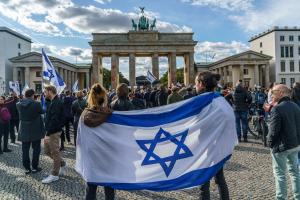1. Why is Jordan so affected by the Middle East conflict?
First, there is geography: Jordan shares with Israel (240 kilometers) and the Israeli-occupied West Bank (95 kilometers) its entire western border, which runs along the Jordan River and the Jordan Rift Valley, respectively. Historically, culturally and demographically, Jordan is closely intertwined with the Palestinian territories. To this day, the Jordanian king is patron of the Islamic sites in East Jerusalem, most notably the Al-Aqsa Mosque, one of the most important sites in the Islamic world. Jordan has a correspondingly strong understanding of the Palestinians and their claim to self-determination and statehood.
Jordan concluded a peace treaty with Israel as early as 1994. Cooperation in the security sector and border protection functions smoothly, and there are also promising approaches to cooperation in other important fields such as water and energy supply. If it were possible to implement a two-state solution, as Jordan has demanded, this potential could finally be fully realized. After all, in the view of many Jordanians, the peace treaty has not yielded any economic dividends, and the hopes for a separate Palestinian state that were cherished in the early 1990s have faded, a large majority of the population now rejects cooperation with Israel. This also limits the government's ability to act in this regard.
2. What is Jordan's assessment of the current escalation of violence in the Middle East?
As in previous escalations in the Middle East conflict, Jordan clearly and unequivocally shows solidarity with the Palestinians. Hamas actually has little support in Jordanian society, either ideologically or in terms of its terrorist approach. Nevertheless, parts of the population initially approved of Hamas's terrorist attack on Israel on October 7. In the meantime, many Jordanians simply point to the many civilian victims of the Israeli countermeasures in the Gaza Strip as well as to the structural problem of the occupation in the Palestinian territories. There is also great indignation against the West. In view of its unrestricted support for Israel, the West is accused of double standards and of disregarding the suffering of the Palestinian civilian population. The previously quite positive reputation and credibility of Europe and Germany are sinking rapidly.
On the political level, Jordan's King Abdullah has been striving for international mediation and de-escalation, most recently meeting German Chancellor Olaf Scholz in Berlin on October 16. However, a top-level meeting with U.S. President Biden, Palestinian President Abbas and Egyptian President Al-Sisi scheduled for October 18 in the capital Amman was canceled by Jordan at short notice after a devastating rocket strike (as yet unexplained) on a hospital in Gaza. Every day that the current conflict continues, decision-makers grow concerned that the heated domestic mood will be exploited by troublemakers.
3. Why does Jordan refuse to accept Palestinian refugees?
During his visit to Germany, King Abdullah declared the admission of refugees from the Gaza Strip a "red line." His foreign minister was even more explicit in Jordanian and Arab TV interviews: "For us in Jordan, we will consider any attempt to expel Palestinians from the West Bank as a declaration of war." This attitude has nothing to do with a lack of humanity for suffering Palestinians. Rather, Jordan fears a repetition of the events of the Israeli-Arab wars of 1948 and 1967, when hundreds of thousands of Palestinians fled their homes, first and foremost to Jordan, and were never able to return. Today, their descendants make up a majority of the population.
The strategic nightmare for Amman has always been a "solution" to the Middle East conflict at Jordanian expense, namely through a mass exodus of Palestinians to Jordan. This would not only strain the country's meager resources (it has already taken in over a million Syrian refugees in the last decade), but also upset the kingdom's delicate demographic and power-political balance - and thus endanger its stability.





